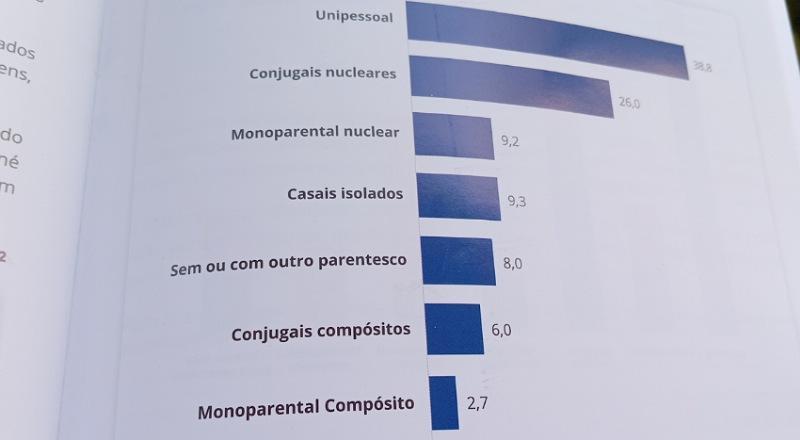Africa-Press – Cape verde. Cape Verde has 10,869 foreign residents, equivalent to 2.2% of the total estimated population, in 2021, of 491,233 inhabitants, with the immigrant population distributed among 7,309 households, reveals the first Foreign and Immigrant Population Survey.Initiative of the High Authority for Emigration, in partnership with the National Statistics Institute (INE), the first Foreign and Immigrant Population Survey (IPEI), still in its socialization phase, concluded that, at the time of the survey, these households they represented 4.9 percent (%) of the total clusters in the national territory.
On average, foreign families are made up of three people, with the particularities of the communities in Guinea (Conakry) and São Tomé and Príncipe having the largest numbers, both with an average size of approximately four people.
Households with just one foreigner are, for the most part, non-marital, corresponding to 58.8%, of which single-person households stand out (38.8%), followed by single nuclear parents (9.2%) of those without or with other kinships (8.0) and composite single parents (2.7%).
This is more significant in the communities of Senegal, Nigeria and Guinea-Bissau, with 38.2%, 34.16% and 31.2%, respectively, and it is true that single parents stand out in the communities of Santomean (22.6%). , Portuguese (24.4%) and Angolan (21.6%).
Furthermore, according to the study, the remaining 41.2% are conjugal types, with 26.0% of the nuclear conjugal type, 9.3% of the isolated couple type and 6.0% of the composite conjugal type.
The households represented by men are mostly of the single-person type, representing around 43.6% and nuclear conjugal (27.6%), and those exposed by women are, for the most part, of the single-person type, with 24.7%, single-parent nuclear, 24.0% and nuclear conjugal 21.2%
Immigrants from the Economic Community of West African States (ECOWAS) lead the list of foreigners in the country, followed by those from Europe, with the majority of the resident foreign immigrant population coming from Africa (65%), of which the bulk is originally from region (58.7%), with a predominance of Guinea-Bissau, followed by Senegal, Nigeria and Guinea (Conakry).
The foreign population is mostly male, representing 7,431 individuals (68.4%) against 3,438 women.
Among the countries in the ECOWAS region, nationals from Guinea-Bissau stand out with 36.3%, Senegal (10.9%), Nigeria (4.7%), Guinea (2.9%), but then Europeans appear with 17.1% led with greater weight by Portugal (8.9%) and Italy (3.7%).
Foreigners from the American continent come in third place, representing 8.3% of the total number of foreigners, with emphasis on Brazilians with 3.5% and North Americans with 2.3%.
Of the data collected, 4.8% of foreigners are from Asia, with emphasis on the Chinese (4.6%) and around 2.9 are stateless.
For the president of the High Authority for Immigration, the study confirms previous trends and reinforces the data that the majority of immigrants come from West Africa, followed by those from Europe and other African countries.
Carmen Barros highlighted that the immigrant population, in terms of education, is on par with the national population, but that there is a feeling of discrimination (above 30%) and that there is a great desire to obtain Cape Verdean nationality, but the feeling of integration is very high, above 80%.
As for the job market, the immigrant activity rate is higher than the national rate, in the order of 80%, the unemployment rate is very low (2%), data that for the Minister of State, Family, Development and Inclusion demonstrate that “the country is committed to the Sustainable Development Goals, eight of which are directly linked to human mobility”.
Fernando Elísio Freire supported the thesis that the archipelago “has an immigration policy duly aligned with the best international practices”.
Cape Verde, according to the government official, has 6,016 immigrants registered within the Single Social Registry, benefiting from all social support, namely Solidarity Income, Productive Inclusion, Social Pension and Social Income.
The president of the Platform of African Communities Resident in Cape Verde, José Viana, considered, in statements to Inforpress, that the study meets the projections, but that the “full integration of emigrant communities is not enough if it is not accompanied by inclusion adequate social status”.
The platform defends a greater opportunity to access the job markets, in circumstances with national citizens, as it clarified that the high employability rate of ECOWAS foreign citizens are, by a large majority, self-employed in informal businesses, without access to goods like insurance.
For More News And Analysis About Cape verde Follow Africa-Press






